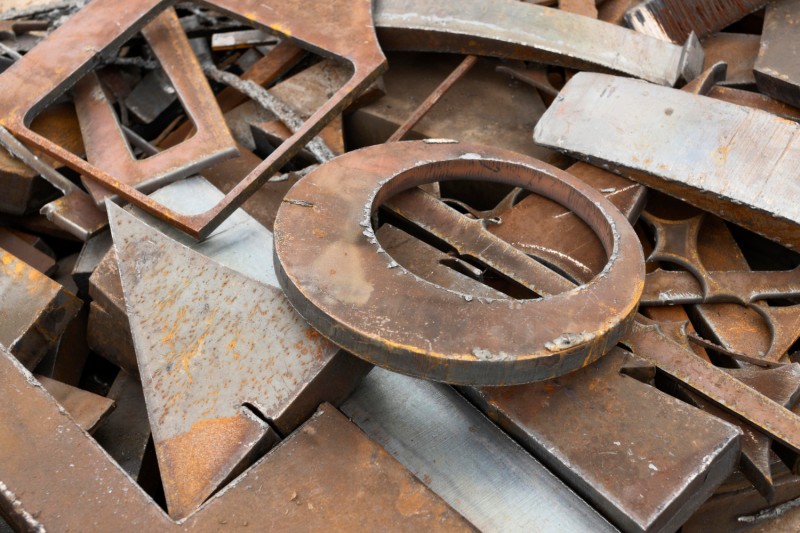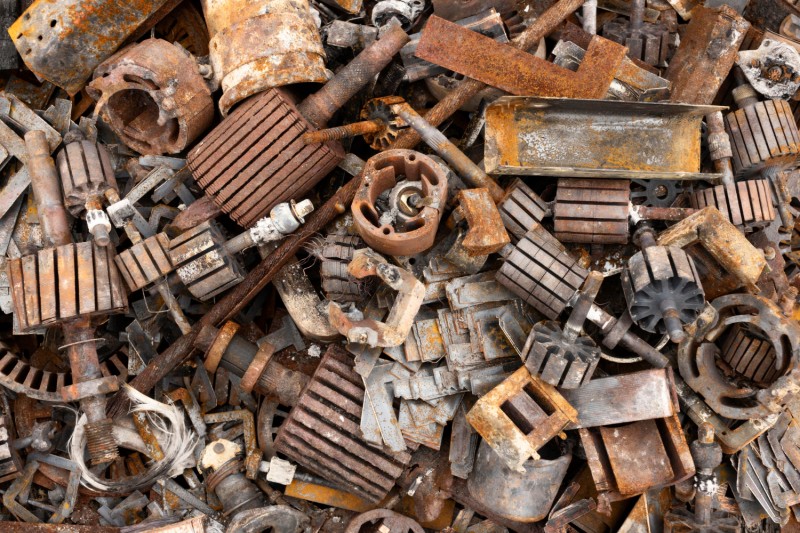later post | index | earlier post
How to Sort Metal for Scrap
Thursday, 25 April 2024
There are many reasons to start recycling your scrap metal. It’s extremely good for the environment, and it can be a great way to earn a bit of extra money from items that would simply be lying around your house collecting rust and dust.
You could turn your scrap into good money quite easily by selling to a local scrap metal yard like ASM Metal Recycling. Recycling metal is much cheaper than mining new metal, so scrap is in high demand within the industry. Yards like ours always prefer customers to have sorted their scrap before they come to us – it makes our job easier, and will get you a better price.
Here’s a guide to sorting metals for recycling.
Stage 1 – How to separate metal for scrap

The first thing you’ll need to do is separate your metals. The best way to do this is to set up a number of bins, and to label them separately, such as:
These can then be used to help you separate your metal as you start sorting, and avoids a big pile to pick through at the end. As you go through your scrap just put them into the right bin.
Stage 2 – Dividing up ferrous and non-ferrous metals
The next stage in sorting metals for recycling is to divide up ferrous and non-ferrous metals. Ferrous metals are magnetic, and non-ferrous metals are non-magnetic.
Iron and steel are two good examples of ferrous metals, with aluminium, copper and brass non-ferrous. You will find ferrous metals most commonly in household items like saucepans, kitchen utensils, cutlery, nails, rivets and screws.
Non-ferrous metals include things like drinks cans, tins, some pots and pans, copper wiring, piping, kitchen sinks, brass and copper door knobs, light fixtures, locks and keys. Non-ferrous metals are generally more valuable than ferrous because they are rarer.
It’s worth noting that iron and steel are often sold together and are sometimes classed as the same when you bring them to scrap yards or recycling centres.
Stage 3 – splitting up the non-ferrous metals
Once you’ve got everything into smaller groups, you can start sorting them into the individual groups.
Copper will typically be coloured accordingly, and is usually found within things like cables, wire and piping, it’ll often be used in plumbing. Look out for red brass, which is a different shade of regular copper and isn’t pure – this is also often found in plumbing materials.
Yellow coloured metals are usually brass, unless you have something you know to be gold. Brass is still the yellower of the two.
Aluminium is nearly always a silver colour, and is typically much lighter than the other metals.
Stage 4 – Splitting up the ferrous metals
Next, you’ll need to split up the ferrous metals. Eventually, you’ll get to the stage where you can do parts three and four at once, but it’s worth splitting them up initially, just until you know what you’re looking for.
- Steel is very solid, and will often be slightly rusty if it’s been weathered
- Lead is exceptionally heavy for its size, so you’ll usually be able to recognise it
- Tin is usually bendable, and will crack whilst being bent
- Stainless steel is completely rust proof, and is typically heavy

Sort by cleanliness
The last thing to do in sorting scrap metal: clean it. It’s a fact that clean metal is simply worth more than dirty metals, so sort your scrap metal according to whether or not it has any rust, dirt, mud and other contaminates. Typically, you should look to completely separate out the most expensive metals such as copper.
Other top tips when you’re sorting scrap metal
To get good money for your scrap metal you need to do more than just sort it.
- Don’t wait too long before selling your scrap – especially ferrous metals. If this rusts it will become worthless
- Ask if your scrap metal needs to be cleaned – some grades of metal, like stainless steel and aluminium, will do and you will get a higher price
- Take pictures of the types of metal you have and send them to your buyer
- Give an estimate of its weight or quantity
Sorting metals for recycling - recycle it with ASM
We can help take valuable scrap metal off your hands and get a competitive industry price. Three of our recycling depots (Aylesbury, Kings Langley and Totternhoe) purchase ferrous metals, including scrap cars, light iron, heavy scrap and cast iron.
Our Westpoint recycling unit also purchases non-ferrous metals, including all the non-ferrous materials discussed in this article. We use the latest digital scales to accurately weigh your metal and give the best valuation based on up-to-the-minute industry prices.
We hope this guide to ‘How to sort metal for scrap’ has helped you. Remember, sorting your scrap is the first step to selling it. Get in touch with us for a quote on selling your scrap metal to ASM.
later post | index | earlier post
Recent posts
- What to do with radioactive scrap metal
- How does metal recycling benefit the economy and the environment?
- 5 common metals that can be recycled
- How does metal recycling work?
- How to Sort Metal for Scrap
- How to classify the different types of waste your business produces
- What is WEEE waste?
- Can iron be recycled in the UK?
- What has the most copper in it to scrap?
- How to better understand scrap metal pricing
- Is there a link between copper and brass prices?
- How to make money from cable scrap
- How many different types of copper are there?
- What can I sell to a scrap metal yard?
- Preparing for the collection of scrap metal